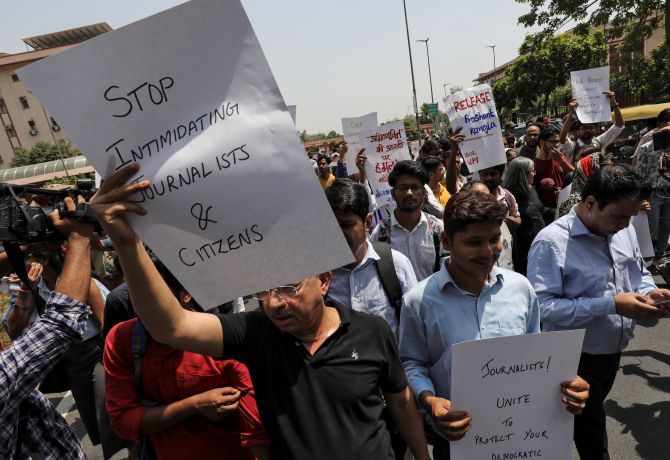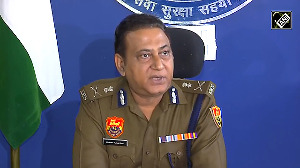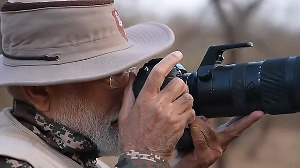The government of UP has made it a habit of sorts to move against -- or better still, lock up -- mediapersons who give cause for displeasure, says Shuma Raha.

Every democracy has a few dark corners, a few undemocratic lapses. But one has to start worrying about its fate when there is a clear pattern of aggression against one of its most important pillars -- freedom of the press.
Last week, the Uttar Pradesh police charged journalist Pawan Jaiswal with criminal conspiracy, cheating and providing false evidence after he did a video report of children being served only rotis and salt for their mid-day meal at a primary school in Seur in Mirzapur.
The video clip went viral, and while we learnt of this shame, this abomination of children being cheated out of the nutritious meal that they're supposed to get under the government's mid-day meal scheme, the person who brought the story to light was painted as an enemy of the state.
What makes the charges against Jaiswal, who works for the Mirzapur daily Jansandesh Times, particularly egregious is that the contents of the video are not in dispute.
No one claims that the children were not served this pitiful repast (parents interviewed later confirmed that the kids did often get only salt with their rice or roti).
What's more, when the report first emerged, the district magistrate visited the school and a few people were suspended.
But in a clumsy pivot soon after, the same district magistrate made the preposterous statement that as a print journalist, Jaiswal had no business shooting a video, that he did so knowing that the school was short of supplies that day, and that the purpose of the entire exercise was to defame and malign the state of Uttar Pradesh.
In other words, a journalist’s exposé of corruption and wrongdoing was depicted as a crime, his job of getting and disseminating news slammed as mala fide.
The government of Uttar Pradesh has made it a habit of sorts to move against -- or better still, lock up -- mediapersons who give cause for displeasure.
In June this year, Prashant Kanojia, an independent journalist, was arrested by the UP police on the charge that he had defamed chief minister Yogi Adityanath by sharing a video on Twitter.
The offending video showed a woman claiming that she had sent marriage proposals to the CM.
Three other journalists belonging to a Noida-based television channel were also picked up after they aired the same content.
All of them got bail a few days later, but let us not be in any doubt that throwing mediapersons in jail at the drop of a hat (and for the flimsiest of reasons) is a brazen attempt to intimidate them.
Journalists are supposed to report facts without fear or favour. The spectre of arrests could have -- and indeed, is meant to have -- the effect of making them do the opposite.
India has been sliding down the World Press Freedom Index in recent times.
This year it dropped two more places and was ranked 140 out of 180 countries.
The index reports that at least six journalists were killed in the country in the last one year.
The cases of violence and intimidation against them are many more, of course.
And perhaps the scariest of them are instances where the State, or any of its arms, targets journalists for doing their job.
Earlier this year, the Meghalaya high court held Patricia Mukhim, editor of Shillong Times, guilty of contempt after the paper carried a few stories about the perks and facilities for retired judges and their families.
Mukhim and the paper’s publisher were asked to pay a fine of Rs 2 lakh each, failing which, their paper was to be banned and they were to be sent to prison for six months.
Subsequently, the Supreme Court stayed their conviction and agreed to hear their appeal.
Journalists who take on the establishment have never had it easy.
However, there is now a ferocity to their vilification and persecution that is not limited to traditionally authoritarian states.
United States President Donald Trump, whose insecurity and autocratic impulses are legion, keeps up a steady Tweetstorm of ugly invective against members of his country’s largely non-pliant mainstream media.
With its arrests of and legal cases against journalists, India seems to be doing one better.
Free speech is the new villain. And democracy is in need of being redefined.
Shuma Raha is a journalist and author based in Delhi @ShumaRaha.












 © 2025
© 2025